- About Us
- Columns
- Letters
- Cartoons
- The Udder Limits
- Archives
- Ezy Reading Archive
- 2024 Cud Archives
- 2023 Cud Archives
- 2022 Cud Archives
- 2021 Cud Archives
- 2020 Cud Archives
- 2015-2019
- 2010-2014
- 2004-2009
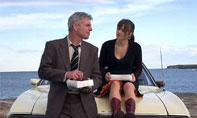 |
The Cud Interview: ‘Solo’ Director, Morgan O’Neill |
In 2005 Morgan O'Neill beat out 1200 other would-be filmmakers to win the inaugural Project Greenlight Australia competition for his script 'Solo', which tells of a jaded, veteran hitman struggling to leave his life of crime behind –as well as the other criminals that inhabit that world- and escape into retirement.
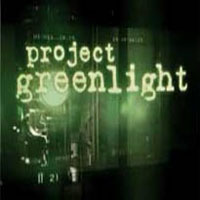 The win afforded Morgan –a NIDA graduate who had heretofore made his living as an actor and musician- the rather slender budget of $1 million dollars with which to bring his tale to life, and he was required by a vicious shooting schedule to do just that within 21 days, and with the added pressure of a three-man camera crew following his every move for a 12-part behind-the-scenes ‘making of’ documentary that screened on the Movie Network last year.
The win afforded Morgan –a NIDA graduate who had heretofore made his living as an actor and musician- the rather slender budget of $1 million dollars with which to bring his tale to life, and he was required by a vicious shooting schedule to do just that within 21 days, and with the added pressure of a three-man camera crew following his every move for a 12-part behind-the-scenes ‘making of’ documentary that screened on the Movie Network last year.
In June his completed film starring Colin Friels in the lead role of hitman Jack Barrett premiered at the Sydney Film Festival and is now in theatres. Recently, Morgan took some time out to chat with The Cud’s Evan Kanarakis about the challenges he faced in creating ‘Solo’, including how he approached casting, what he might share from his experience about matters of compromise in filmmaking, and his take on the current state of the Australian film industry.
The Cud: There's been a lot of discussion with you elsewhere about the obvious challenges you faced in making this movie- most notably the limited budget and short time frame for filming, and the fact that on your directorial debut you had a documentary crew on the set. How did you prepare for these kinds of challenges? Was it just too much of a step into the surreal for even your experience as an actor and having been on film sets already to significantly help?
Morgan O’Neill: I was lucky enough to have lunch with Bruce Beresford a few weeks into post-production on Solo. He was very interested in how I was getting on considering the challenging budget and the flow on in terms of lack of time. I was telling him how much I could have done with more time, more money, more takes, more light etc when he stopped me. He said that what I was talking about is called filmmaking, and that it doesn’t matter whether the budget is a million or a hundred million, you’ll always be facing the same dilemmas, only on a different scale. You’ll always wish you had more resources, and you’ll always be forced to adjust your vision and execution on the run.
The more I think about his advice, the more I think he’s hit the nail on the head. I discovered in the course of making Solo that there are really only two major components to being a writer/director– solving problems and telling a story. If you can do the first without compromising the second, you’re on the right track.
Looking back on the film, I actually think that in many cases the challenge of not having enough resources has actually made for an overall better film. When faced with a problem, we simply didn’t have the luxury of throwing money at it. We were forced to go back to the drawing board and try and solve it more inventively, more creatively. Thinking outside the box like that is actually really energizing to a cast and crew, and I think you can see that almost guerrilla excitement in most frames of the film.
The challenge of being followed around by a three camera documentary crew was a whole other thing. It was hard to escape the idea that I’d been given this amazing opportunity, and the doco cameras were there to record how I potentially fucked the whole thing up! It was full on and unrelenting, but I only had to remind myself that their presence on set meant we had a set in the first place – without the documentary series there’d be no film. So that helped things, as did the fact that they were really nice blokes who were much more interested in documenting the trials and tribulations of making low-budget films than they were in making reality TV.
The Cud: And given these kinds of challenges, other than the obvious, like ditching the documentary crew, what would you definitely ensure be different as part of the process in your next film?
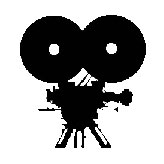 Morgan O’Neill: Not too much, to be honest. I guess we might have shot on 35mm, but the Kodak super 16mm stock really worked for our purposes – I think it matched the overall tonality of the story. There were certainly scenes where I’d have killed for a little extra coverage, or a couple more takes. Some of the scenes are shot in a single take for instance, simply out of time restraints. That said, I come back to the idea that there’s an energy in that sort of film-making that cannot be captured by throwing buckets of money against a problem. I guess what I would have liked more than anything else would be a couple of weeks off half way through the process to take stock of where things were going, and what I could be doing better. That time to reflect and ferment would have been incredibly valuable to me as a first time writer/director.
Morgan O’Neill: Not too much, to be honest. I guess we might have shot on 35mm, but the Kodak super 16mm stock really worked for our purposes – I think it matched the overall tonality of the story. There were certainly scenes where I’d have killed for a little extra coverage, or a couple more takes. Some of the scenes are shot in a single take for instance, simply out of time restraints. That said, I come back to the idea that there’s an energy in that sort of film-making that cannot be captured by throwing buckets of money against a problem. I guess what I would have liked more than anything else would be a couple of weeks off half way through the process to take stock of where things were going, and what I could be doing better. That time to reflect and ferment would have been incredibly valuable to me as a first time writer/director.
The Cud: Tell us a little about the key casting choices of Colin Friels into the role of Barrett and Bojana Novakovic as Billie. Was there any sort of opportunity for rehearsal with your actors?
Morgan O’Neill: Casting Billie (Bojana Novakovic) was interesting. I imagined that the role would cast itself, in as much as there’d be 8 or 10 fabulous actresses in their early twenties who’d eat up a role like this. But as the actresses came into the casting offices, I began to get scared that I’d written an unplayable role– either they were too old and not plausibly uni age, or they were too young and couldn’t nail the headspace. So when Boy walked into the room I almost leapt out of my chair. I’d seen her before in a few roles and had admired her distinctly “live” energy, which she delivered in spades both in the audition and her eventual performance.
Colin was a different story. He was on the top of our wish-list, but I don’t think anyone really anticipated he’d want to come and play with us, especially when you consider it was my debut feature and we could only pay award wages to everyone. So when my phone rang and it was Colin on the other end, my heart skipped a beat. He invited me round to his place for a feed and a couple of beers, where he told me how much he loved the script but that he couldn’t do it. I replied that I hadn’t really imagined that he’d be able to do it anyway– especially for award. He told me it wasn’t the money– he just didn’t want to play a crooked cop again. He’d done that too much. I was a little perplexed –the crooked cop was being played by Vince Colosimo– I wanted Col to play the main guy, Barrett.
He paused, weighing up this new information.
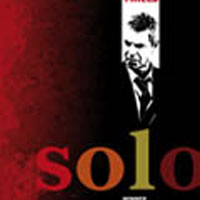 “Oh fuck”, he said “I’ll do it then.”
“Oh fuck”, he said “I’ll do it then.”
And that was that. Getting Colin on board was probably the single most important part of pre-production. His incredible skill was the major factor behind being able to get it done in the time we had. For me as a first timer, it was like film school every day.
The entire casting process was so humbling. In addition to Colin, Bojana and Vince, we had the likes of Bruce Spence, Angie Milliken, Chris Haywood, Linal Haft and Tony Barry putting their hands up to take a punt on a complete unknown. I was so excited at the cast and crew screening to be able to in part repay their generosity.
In terms of rehearsal, we really didn’t have any. A day to read through the script and make sure that everyone understood my sometimes oblique writing and that was it. Together with Sue Seeary, the producer, we made the decision early on that we were better served by spending more time casting the roles and less time rehearsing them, as no amount of rehearsal would make the wrong actor right. I’m also a pretty firm believer in the power of terror to get things right on the day – great actors rise to the challenge of winging it.
The Cud: What did the experience tell you about the matter of compromise in filmmaking? What was the biggest compromise you had to make in creating this movie?
Morgan: Compromise is as fundamental to film making as the camera. Sue Milliken took me aside at the beginning of the process and gave me some incredibly sound advice. “Know your story, choose your battles” she said. It took me a while to understand exactly what she meant, but I took it to mean draw a line in the sand, and work out what is elemental to the storytelling, and what is peripheral, and work back from there.
The Cud: Speaking of compromises, what will be different on the Director's Cut of 'Solo' in ten year's time?
Morgan: I can’t imagine that it will be too different to what audiences are seeing now. We shot a ratio of 11:1, which means that for every 11 minutes of film we shot, we used 1 minute on screen. While that sounds pretty luxurious, it’s not – it’s an incredibly lean ratio which meant that we had to use almost all of what we shot. I think of the 480 setups we shot, we used 475 of them. There’s not a lot left on the cutting room floor.
I just hope that I’m doing the 10-year anniversary edition DVD commentary having made 4 or 5 films in the meantime…
The Cud: There seem to be far more Australian films in the cinemas this year than has often been the case in the past. Do you think it has been a matter of Australian audiences having been raised too much on a diet of big budget, big star Hollywood films, or simply a lack of sustained quality in our local product? There has been an odd, almost stigmatic resistance among many in the general public against watching Australian films in recent years save for the rare hit, and the rest seem to be dismissed as 'mere art house offerings'. Travel somewhere like France or Germany, however, and their filmgoers seem to pay near equal credence to foreign and local product. What gives?
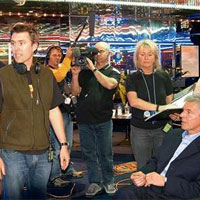 Morgan: I think it’s important to be aware that there’s been a turn-around in the Australian film landscape over the last 18 months or two years. Before that, it’s fair to say that local films were suffering a bit- it seemed that audiences had become a little jaded with the Australian stories we were telling on screen. It wasn’t so much that the quality was lacking, but it seems to me that we were making the same film over and over again. There’s nothing wrong with the quirky Australian comedy, but only if it sits within the context of many other stories. For a while there it seemed to be the only thing we produced. Who can blame the audience for looking elsewhere? During this time, I read that the percentage of total box office that was domestic was less than 1%.
Morgan: I think it’s important to be aware that there’s been a turn-around in the Australian film landscape over the last 18 months or two years. Before that, it’s fair to say that local films were suffering a bit- it seemed that audiences had become a little jaded with the Australian stories we were telling on screen. It wasn’t so much that the quality was lacking, but it seems to me that we were making the same film over and over again. There’s nothing wrong with the quirky Australian comedy, but only if it sits within the context of many other stories. For a while there it seemed to be the only thing we produced. Who can blame the audience for looking elsewhere? During this time, I read that the percentage of total box office that was domestic was less than 1%.
When you look back at the last two years of film output, however, you can see that things have shifted significantly. From Wolf Creek to Look Both Ways, Little Fish to Ten Canoes, The Proposition to Candy, and hopefully Solo somewhere in there, it’s clear that we’re telling different stories, providing the audience with cinematic options. Pundits have been describing it as a “renaissance” in the Aussie film industry, and while that word is thrown around a little too loosely for mine, I think there’s some merit in it. It certainly seems to me that people are coming back to Aussie films less out of a sense of duty, and more out of a sense of genuine excitement.
The Cud: Finally, what's next for you? An acting role or another opportunity to direct?
Morgan: I love acting, always have. I think the fact that I’m an actor was part of the reason we were able to shot Solo in 21 days, as I was able to talk to the actors in terms that they understood, and hopefully to cut to the chase a little more. But it’s a frustrating existence, as you’re reliant on so many people to validate your talent before you’re allowed to practice it.
As a writer, I can at least write without anyone else allowing me to do so. When combined with directing, I have to say there’s nothing to compare. The idea that I have some control over the total canvas, rather than just that one particular brush stroke, is immensely appealing to me. I’ve written another couple of scripts that are in various states of undress. I’d love to think that I’ll be bringing them to a screen sooner rather than later.
‘Solo’ is currently screening at Dendy Cinemas around Australia.
